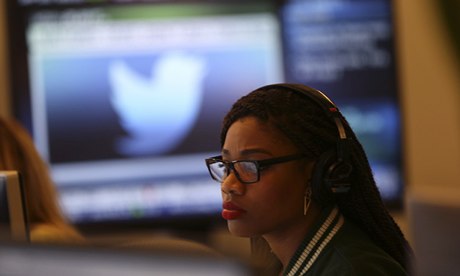
Twitter will be valued at more than $14bn (£8.7bn) when the social media company starts selling its shares on Thursday. The company said it was pricing its Initial Public Offering (IPO) of 70 million shares of its common stock at $26 per share, raising $1.82bn in new money and leaving the company valued at $14.2bn.
The share price has risen as the company's executives have been making their case to investors on their "roadshow". Twitter had originally estimated a price range of $17-$20, but on Monday that was upped to $23-$25.
Twitter's IPO will make billions for some of Silicon Valley's top names, including co-founders Ev Williams, who owns 59.6m shares and will add $1.47bn-plus to his net worth from the sale, and Jack Dorsey, who owns 23.4m shares. Twitter's other backers include Amazon's founder Jeff Bezos, and Marc Andreessen, Netscape's founder turned serial investor.
The sale is the most hotly anticipated tech IPO since Facebook's last May. But that sale proved a disaster, with technical glitches marring the opening day, followed by a share crash. Twitter's executives have privately worried about repeating one of the errors of Facebook's IPO by setting too high a price for the shares.
Facebook sold its shares at $38 – the top end of the range it had set – and found that long-term investors were not keen to hold the stock after reports that the company was struggling to make money from mobile advertising. Shares slumped shortly after the IPO and it took a year for the shares to pass the price they launched at. But pricing Twitter's offer too low would reduce the money the company could raise.
Before the pricing, Tomas Freyman, director of valuations at BDO, worried that history was about to repeat itself. "Despite Twitter's price range valuing being more modest than some of the numbers bandied about over the last few weeks, this is still very high for a company that has yet to make any profits," he said. "Value in Twitter is being largely driven by the hype surrounding the brand and the recent successes of other online businesses including Google, LinkedIn and Facebook, despite the latter's early wobbles.
"Investors will inevitably make up their own minds on the appropriate valuation, but we should all be mindful of the 'real' drivers of value, namely cashflow and profitability," he said.
Other investors including Ironfire Capital and Gamco had predicted the company could be valued at $15bn-$20bn. Jeffrey Sica, president of Sica Wealth Management, recently predicted Twitter could soar as high as $40bn, but told Bloomberg the company would be "overhyped" if the valuation rose above $30bn.
In a note to investors, Brian Wieser, senior research analyst at Pivotal Research, set a buy price of $29 on the shares despite "limited growth of users in the United States and around the world".
"Twitter's scale is big enough and (critically) unique enough to have sufficient scale to be a big business, if one that is unlikely to ever match Facebook's ultimate size," he wrote. "We can envision the stock moving past our price target quite rapidly, although how high is 'up' will be a function of the vagaries of demand in the market compounded by what we think will be positive operating momentum in the near-term.
"But we also expect that the stock will inevitably face some downward pressure at some point, whether because of sales due to lock-up expirations (which should occur in both February and May of next year), because of short-term missteps by the company (perceived or actual), competitive actions by competitors or because user trends fail to meet investor expectations," wrote Weiser.
During Twitter's roadshow, investors have questioned the company's ability to generate revenues and profits. Executives have also faced questions about its ability to expand its user base and rein in spending. The company has been highly acquisitive in the runup to the IPO and lost $143m over the past year on revenue of $534m, according to its most recent regulatory filing.

